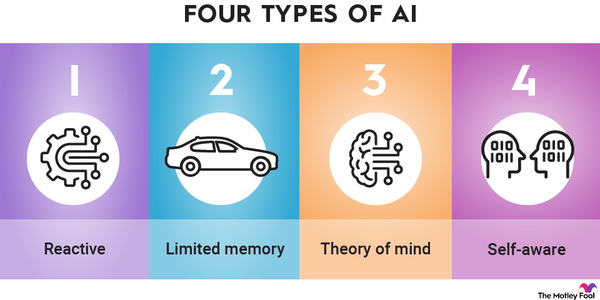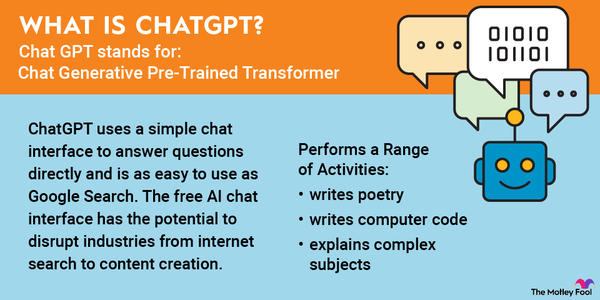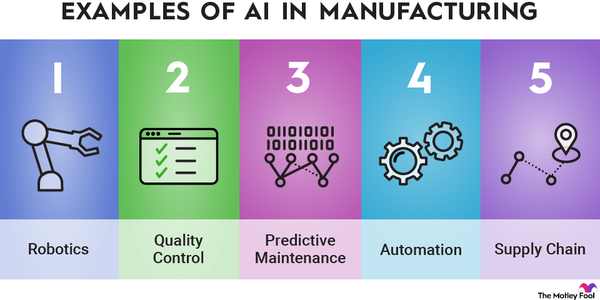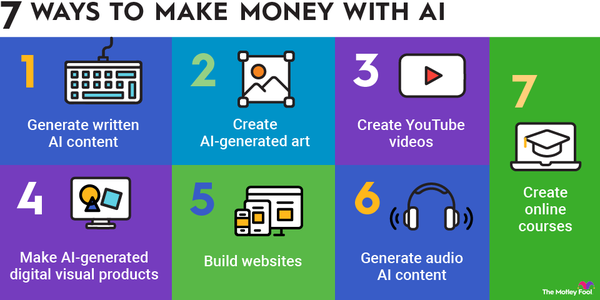When you think of artificial intelligence (AI), you probably don't think of real estate. After all, real estate has traditionally been a slow industry to innovate. Most transactions are still done through traditional brokers and independent landlords, even with real estate investment trusts (REITs) being the big players.
However, like much of the business world, the real estate industry is embracing the power of AI, which holds implications for both commercial real estate and residential real estate.
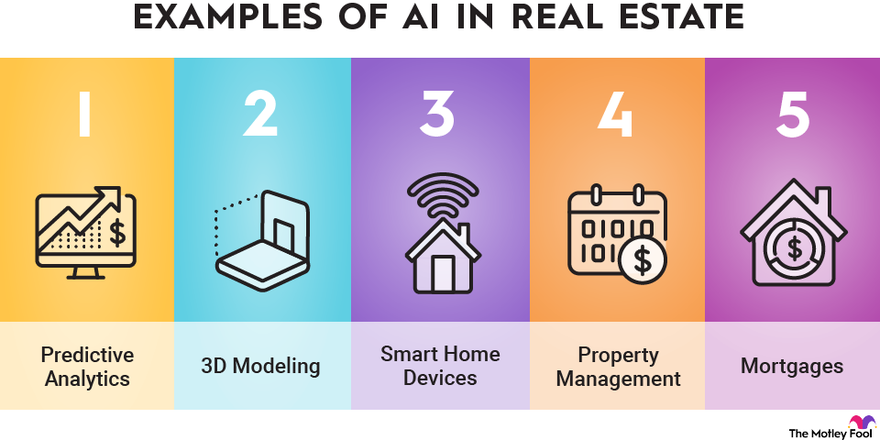
Any business that involves data is a good target for AI, and there's plenty of data in real estate. Appraisals and estimates have traditionally been based on neighborhood comparisons and human opinion, but AI-based algorithms are increasingly used to generate these estimates. For example, Zillow Group's (Z 3.21%)(ZG 2.97%) Zestimate is powered by AI.
Even generative AI now plays a role, creating 3D models of properties so potential buyers can use any connected device, such as a smartphone or tablet, to get a sense of how the properties look. The technology took off during the COVID-19 pandemic, when sellers were reluctant to have buyers in their homes, and has continued to grow.
Finally, AI also plays a role in smart-home devices, like thermostats, lighting, cameras, and monitoring devices, to inform landlords of any problems needing attention, such as a plumbing leak. In this look at AI in real estate, we'll explore ways the new technology is changing the industry and provide some examples.
Understanding AI
Understanding AI
AI is generally understood as the ability of computers and machines to handle tasks that require human intelligence. Machine learning, one of the most common applications of AI, involves training machines with large amounts of data to recognize patterns, analyze data, and run forecasts and algorithms.
Supervised Machine Learning
These applications are common in real estate. More broadly, AI technology includes computer vision in autonomous vehicles, robotics, neural networks, voice recognition, and natural language processing. Keep reading to see five ways AI is used in real estate.
Five uses
Five uses of AI in real estate
1. Predictive analytics
Perhaps the most common and practical use of AI in real estate is predictive analytics. When you see an estimate on the value of a property, it's generally based on predictive analytics from AI.
Zillow, the leading online real estate marketplace, uses AI for its Zestimates -- the proprietary valuation estimates it provides -- and for personalized recommendations, floor plans, and photos. Rival Redfin (RDFN 5.58%) uses AI for similar estimates and offers users an AI-powered tool to enhance and redesign listing photos.
Forecasting is important, especially when investing in commercial real estate. Investors, agencies, and economists use AI to predict where the real estate market is headed, hoping to get an edge on the competition and buy at the right price.
2. 3D modeling
Visual representations have become increasingly important in real estate. It's one of a number of industries taking advantage of digital twins -- AI-based computer images that allow users to explore a space digitally.
Matterport (MTTR -2.47%), a leader in technology, creates 3D virtual tours of properties. These tours allow potential buyers to use augmented reality and other features to explore a property before visiting in person. Matterport's proprietary AI is called Cortex AI, a neural network that uses computer vision, image processing, and deep learning to automate 3D image construction.
The technology helps increase the pool of potential buyers since anyone with a connected device can get a good look at the property. It also helps buyers, sellers, and agents save money by screening potential buyers to ensure they're interested.
Some start-ups are building similar technologies that show renderings of properties that don't exist yet. Some of them focus on assisting architects and offer tools that can give cost estimates based on different designs.
3. Smart home devices
Real estate is a massive industry, and property tech might be overlooked next to REITs worth tens or hundreds of billions of dollars. However, property tech, or proptech, represents a fast-growing niche in the real estate industry.
Proptech focuses on devices that help landlords and homeowners remotely monitor properties. These include smart home devices, such as smart doorbells, locks, thermostats, and cameras, that help notify people of any problems that might occur inside the property.
AI helps devices learn user preferences and adjust settings as needed. They can help save money on utilities, improve tenant satisfaction, and help the landlord stay up to date and avoid major repairs.
4. AI in property management
Property management is another important subsector of real estate. AI helps managers screen tenants, collect rent, and schedule maintenance.
AI chatbots can play a role in tenant screening, much like their uses for customer service in other industries. They can answer questions about rental rates and availability and guide customers through the application process, alleviating some of the work required of human agents.
AI automation can assist with processing payments, managing workflows, performing market analytics, and managing collections. Additionally, AI assistants can generate reports to track leasing performance, helping improve occupancy and operational efficiency.
5. Mortgages
Artificial intelligence is also gaining increasing adoption in financing, including mortgages. In underwriting, AI is used to analyze borrower information, such as credit scores, income, and employment history, to evaluate the borrower's risk profile and find the best rate to charge.
Artificial intelligence tools help detect and prevent fraud and can automate loan servicing tasks, such as payment processing and customer communication. Some mortgage lenders, like Rocket Companies (RKT 1.63%), use AI to deliver near-instant decisions on mortgage applications.
For instance, the company offers mortgage approvals in as little as eight minutes. In April 2024, it launched Rocket Logic, an AI-driven platform to simplify the mortgage application process for homebuyers and deliver approvals faster.
Related investing topics
World-changing?
Will AI change the world of real estate?
Real estate is a massive, fragmented industry that is typically slow to change. However, the examples above show that AI is already impacting areas like predictive analytics, property estimates, smart home devices, mortgages, and others. As artificial intelligence improves, it's likely to become an even bigger part of the real estate industry.
If you're an investor searching for exposure to AI, consider AI stocks or AI ETFs or learn more about real estate investing to discover more opportunities to use AI in real estate. Keep your eye out -- more real estate companies are set to embrace AI in the future.
FAQ
Artificial intelligence in real estate: FAQ
How is AI used in real estate?
Artificial intelligence is being used in real estate in a variety of ways. For example, AI-generated 3D models allow prospective buyers to tour a property without leaving the comfort of their homes. AI is also gaining popularity in underwriting to evaluate credit scores or employment history.
Is AI going to take over real estate?
Like many market sectors, AI is unlikely to replace humans entirely within the real estate industry. Too many situations require a human touch for this to be a realistic goal. However, AI will likely continue to grow within real estate since it can help cut costs.
Jeremy Bowman has positions in Redfin. The Motley Fool has positions in and recommends Matterport, Redfin, and Zillow Group. The Motley Fool recommends the following options: short November 2023 $12 calls on Redfin. The Motley Fool has a disclosure policy.








